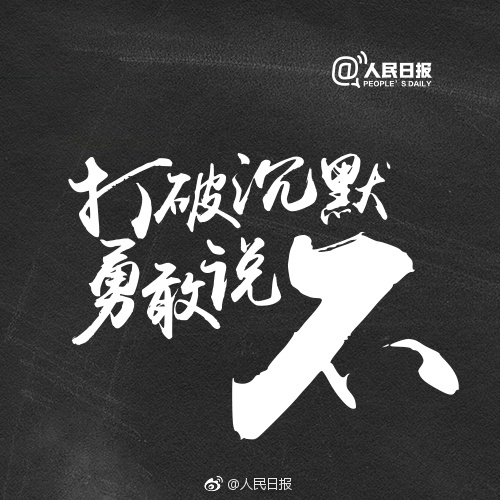People’s Daily encourages more ‘silence breakers’ in nod to #MeToo movement
People’s Daily encourages more ‘silence breakers’ in nod to #MeToo movement


A quasi-official response to the burgeoning #MeToo movement in China has finally arrived. In response to Beihang University’s decision to remove Professor Chen Xiaowu 陈小武 from his position after sexual harassment allegations from four women, on January 12, the Communist Party’s house newspaper, the People’s Daily, posted a brief comment (in Chinese) to its Weibo social media account: “We applaud Beihang for not hiding evil nor covering up the crimes. We have zero tolerance for teachers who violate professional ethics.”
The newspaper praised the school as a role model for other institutions in China. “Break the silence,” the author writes. “When more and more victims come forward and say ‘Me Too,’ we’ll see more abusive teachers be exposed and fewer cases of sexual harassment on Chinese college campuses.”
The global hashtag campaign #MeToo, which began in October 2017, inspired by the women who spoke out about Harvey Weinstein’s predatory behavior, has only just started to gather steam in China. Earlier this month, Luo Qianqian 罗茜茜, a former student at Beihang University, stood out to accuse Chen of sexual harassment and called for more victims on college campuses to tell their stories. Luo’s bravery prompted a wave of women across the country to join the movement, including the well-known women’s rights activist Xiao Meili 肖美丽, who wrote an open letter to her alma mater, the Communication University of China, proposing a system to prevent on-campus sexual harassment.
However, it remains to be seen if official support will go much beyond a tweet-length statement of support — the Chinese government has a record of aggressively cracking down on feminist organizing and censoring public discussions about sexual harassment and gender equality.
RELATED:
Yammie Lam, a former Hong Kong actress who left the world of show business in 2004, returned to public attention on January 10 after an old video surfaced online of her accusing two big names in Hong Kong’s entertainment industry, Eric Tsang and Alan Tang, of raping her more than 20 years ago.
One of China’s most prominent women’s rights activists, Xiao Meili 肖美丽, pushes the #MeToo conversation forward: “It’s imperative that Chinese colleges construct a mechanism to prevent sexual harassment on campus.”
EARLIER THIS WEEK
China has its Ashley Madison moment. In Guangzhou, Chinese scammers use sexy robots — virtual women — to lure and fleece their marks on dating apps.
People’s Education Press (PEP), a state-run publication house, dismissed widespread accusations that it had removed content about the Cultural Revolution in a history textbook for eighth-grade students. Though the publisher said the second volume of the book would cover the topic, the incident prompted an uproar of criticism among internet users.
—Jiayun Feng
- High-speed train etiquette
She’s got a ticket to ride. Not really. / Politics from the Provinces
“In China, having a rail ticket doesn’t guarantee you’ll get to where you need to go. That was the case in Anhui Province last week, when a Hefei primary school teacher stopped a high-speed train from departing the station on time, by preventing the train door from closing to allow her tardy husband to get on board to join her and their daughter on a trip to Guangzhou.” - Crime and medicine
Gang jailed for manufacturing, selling fake medicine to Chinese hospitals / SCMP - Cinema and search
Teen stars and red films: What China Baidu-searched in 2017 / China Film Insider






